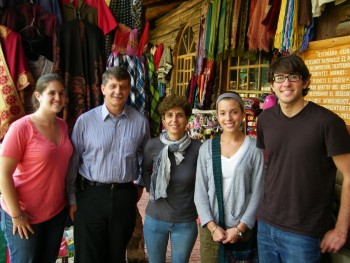Seeking "La Justicia"

Left to right: Rachel Schwartz '11, U.S. Ambassador to Guatemala Stephen McFarland, Benjamin R. Collins Professor of Social Science and Associate Professor of Political Science Anita Isaacs, Juliana Morgan-Trostle '12, and Alejandro Rettig y Martinez '12
Details
How can justice—“la justicia”—be achieved in post-war Guatemala? What does this concept mean to different sectors of Guatemalan society: judges, lawyers, military leaders, victims' organizations, and human rights activists?
These are questions Benjamin R. Collins Professor of Social Science and Associate Professor of Political Science Anita Isaacs and her three student research assistants—Juliana Morgan-Trostle '12, Alejandro Rettig y Martinez '12, and Rachel Schwartz '11—sought to answer when they traveled to Guatemala this May. The goal of the trip was to conduct interviews for Isaacs' book-in-progress about transitional justice in Guatemala following its 36-year civil war.
The country's corrupt political climate makes it nearly impossible for war criminals to pay for their atrocities, says Rachel Schwartz, who made a second trip to Guatemala with Isaacs in July.“Perpetrators are rarely brought to justice, and many victims are afraid to pursue it,” she says. CICIG, the United Nation's International Commission Against Impunity in Guatemala, is helping the country in its efforts to dismantle organized criminal networks.
One particularly powerful aspect of the trip was a visit to an exhumation site in Guatemala City, where forensic anthropologists try to identify the remains of those murdered during the war, which was fought from 1960-1996 by the military-influenced Guatemalan government and insurgent organizations.“We talked to various people and watched them go about their work, which to them seemed so ordinary and professional—open up a mass grave, dig up bones, divide them into neat stacks and piles,” says Juliana Morgan-Trostle.“But such work, at once rote and methodic, was simultaneously a quest for justice, to bring closure to families.” This was especially evident, she says, at the site's headquarters, where volunteers scrubbed bones with toothbrushes while an indigenous family knelt before a skeleton, lit a candle, and said a prayer.
“I couldn't help but be moved by the dedication and courage of those working at the site,” says Alejandro Rettig y Martinez.“Work this controversial in a country whose justice system is completely nonfunctional can be dangerous for employees and their friends and families.”
The Haverford group also accompanied U.S. Ambassador to Guatemala Stephen McFarland to the western region of San Marcos, where a mine has been causing controversy in the community. Ignoring international and domestic regulations, the government failed to consult with local residents about the development of the mine or inform them of potentially harmful side effects. Schwartz admired Ambassador McFarland's methods of engaging with the people.“He listened to all sides of the issue,” she says.
In July, Schwartz returned to Guatemala with McFarland, Isaacs and lawyer/activist Jorge Morales, the Center for Peace and Global Citizenship's first Global Leaders Fellow. They went to the town of Rio Negro, which had been hard hit by the civil war; five massacres occurred in the town between 1980 and 1982, one of which exclusively targeted women and children. While interviewing survivors, Schwartz learned that the massacres could be traced back to a hydroelectric dam project; in order to build the dam, the government attempted to displace the people of Rio Negro. This was an eerie echo of San Marcos's mine-related conflict.“We saw how the past seeps into the present,” says Schwartz.
Throughout the summer, the three students—all political science majors—have been transcribing interviews for Isaacs' book. They will all serve as Isaacs' teaching assistants for her“Comparative Politics” class this fall, and Schwartz is basing her senior thesis on her experiences in Guatemala.
“The opportunity to go into the field and see first-hand what we've been studying was extraordinary, personally and intellectually,” she says.
-Brenna McBride



